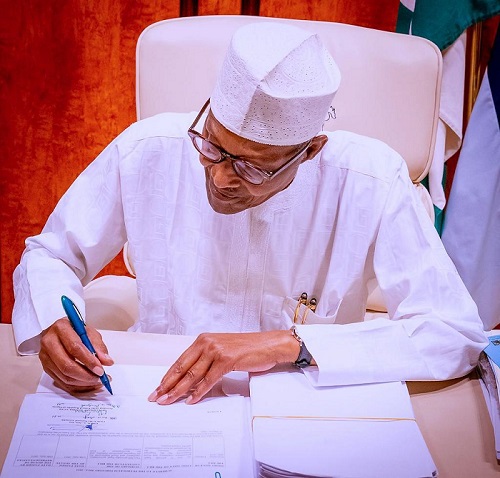President Muhammadu Buhari
President Muhammadu Buhari commended the implementation of the electronic call-up system set up by the Nigerian Ports Authority (NPA) to address the perennial gridlock along the port corridor in Apapa, Lagos.
The Acting Managing Director of NPA, Mohammed Bello Koko recently assured maritime stakeholders that the electronic call-up system along with the eto app developed to manage the movement of trucks in and out of the Lagos ports is being strengthened to put an end to the notorious Apapa gridlock.
But speaking in his Independence Day address in Abuja, President Buhari said that while the effect of government’s various interventions to reduce the gridlock have been slower than expected, “the implementation of the electronic call-up system as well as the conversion of the Lillypond Container Terminal to a vehicle transit area will further enhance the ease of cargo evacuation.”
He said his government remains concerned by the significant transportation infrastructure deficit in the country.
“Addressing the challenges our commuters and lorry drivers face on the motorways is still a high priority to us,” he said.
The President also assured that the plan to secure the country’s waters and the Gulf of Guinea through the Integrated National Security and Waterways Protection Infrastructure, also known as the Deep Blue Project, was being achieved, and Nigerians and stakeholders in the entire region would soon feel the impact.
“Earlier this year, I launched the Integrated National Security and Waterways Protection Infrastructure, the Deep Blue Project, which is designed to secure Nigerian waters up to the Gulf of Guinea. I am happy to inform Nigerians that we have taken delivery of key assets for this project and very soon, its impact will be felt,” he said.
The Deep Blue Project is a security architecture by the Federal Ministry of Transportation, domiciled with the Nigerian Maritime Administration and Safety Agency (NIMASA).
On his part, the NIMASA Director General, Dr. Bashir Jamoh, stated that the agency was more committed to zero tolerance for insecurity in the country’s waters than ever before.
Jamoh also disclosed that the agency was engaged in continuous collaboration with critical stakeholders in the pursuit of its mandates.


Comment here